|
|
|
Sort Order |
|
|
|
Items / Page
|
|
|
|
|
|
|
| Srl | Item |
| 1 |
ID:
188970
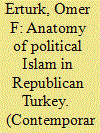

|
|
|
|
|
| Summary/Abstract |
The Milli Görüş political Islamic movement and the first political parties under its banner were founded and dominated by the Naqshbandis. Numerous scholars have so far suggested that political participation has led these groups to transform and moderate their former Islamist views over time. This study examines this possibility by scrutinising how Naqshbandi and Milli Görüş leadership perceive the state, essential political institutions such as the legislature, political parties, opposition, elections, and independent media, together with some defining issues in Islam such as jihad, excommunication, and al-wala’ wa-lbara’ (loyalty and disavowal). In particular, the study seeks to uncover how the Naqshbandi theological background has been turned into a political Islamist ideology through the influence of two important Naqshbandi shaykhs, Mehmed Zahid Kotku (1952–1980) and Mahmud Es’ad Coşan (1980–2001), and two leading Naqshbandi-affiliated Milli Görüş leaders Necmettin Erbakan and R. Tayyip Erdoğan to reveal if/to what extent Islamists’ participation in politics has transformed their Islamist views. As a methodology, content analysis and political discourse analysis have been used. The findings demonstrate a continuity of Islamist Naqshbandi thought in Milli Görüş leadership and that political participation has neither ‘democratised’ nor ‘moderated’ these parties and their radical Islamist thoughts.
|
|
|
|
|
|
|
|
|
|
|
|
|
|
|
|
| 2 |
ID:
188959
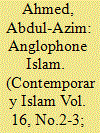

|
|
|
|
|
| Summary/Abstract |
The field of ‘Islamic Studies’, like ‘Religious Studies’, is a broad-church. It includes a number of epistemological and ontological positions associated with a range of disciplines. The diversity inherent in a category such as ‘Islamic Studies’ is challenged by a bifurcation of two predominant approaches found within the field, the textual and the sociological. In this paper, I seek to propose a new concept for contemporary Islamic studies, that of Anglophone Islam, which will allow a broader range of scholarship to be contextualised in relation to each other. The concept also opens a new set of questions to be explored by scholars of Islamic studies. It will be of particular interest to scholars involved in contemporary Islamic studies in fields such as American Muslim studies, British Muslim studies and European Muslim studies, but will also have utility to theological, historical and philosophical scholars of Islam working in the English language.
|
|
|
|
|
|
|
|
|
|
|
|
|
|
|
|
| 3 |
ID:
188971
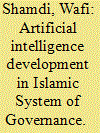

|
|
|
|
|
| Summary/Abstract |
The applications of artificial intelligence (AI) in our daily activities have helped us accomplish our tasks more effectively and efficiently. With the advancement of computing power and the Internet, AI systems have been applied in many areas such as business, management, and health. This paper analysed the possibility of integrating AI into the Islamic System of Governance (ISG). This research utilised Amin’s ISG, which provides a set of analytical frameworks for gearing relevant organisations towards achieving their objectives. The ISG was derived from the Prophetic Madinian Polity and thus adopted elements of the polity. For instance, the ISG set the Maqāsid of the Sharī’ah as an organisation’s strategic objectives and constructed the Islamic Governance operational framework with four components from elements of the polity: (1) Tauhid, (2) Juristic, (3) Values, and (4) Cultural. A comprehensive literature review was conducted to look into the integration of AI with this ISG. The research findings indicated that there is not much research conducted in this area. Therefore, we explore the potential of applying AI in the context of an ISG. Several researches have investigated the integration of AI into some of the ISG components like the Juristic, Values, and Cultural, in other areas and contexts. However, none of them is completely suitable for the ISG context. Furthermore, none of the research was done as an integrated whole, thus, ignoring the relational dynamic between the components of ISG. Hence, a more comprehensive study is required to fill the gap in deploying AI with the ISG.
|
|
|
|
|
|
|
|
|
|
|
|
|
|
|
|
| 4 |
ID:
188976
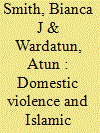

|
|
|
|
|
| Summary/Abstract |
This article argues that the Sufi practice of dhikr in combination with Quranic recitation and prayer can be understood as “hidden agency” Muslim women exercise in their mediation of violence and piety, particularly so in attempts at lessening their suffering of domestic violence. Our arguments indicate that women actively work towards employing a spiritual approach to their suffering that can be described as Sufi and that they exercise agency in an Islamic way that is bound by their connection with Allah. Our use of the term agency is therefore a nuanced one that is multidimensional and flexible in that it can expand and contract in different circumstances and is at the same time concerned with one’s embeddedness in Allah’s Divinity. This understanding of agency contrasts with normative sociological and feminist ones that see agency as a human’s capacity to act in response to social structures and power relations without necessarily allocating a dimension for an understanding rooted in Divinity. Based on anthropological fieldwork from 2017 to 2020 in Lombok, West Nusa Tenggara, Indonesia, we explore Muslim women in abusive marriages by engaging the notion of a pluralized agency that women exercise in an Islamic framework. The article further considers ethical tensions feminists face when working with women victims who do not live from a human rights understanding of domestic violence and instead focus on enhancing piety in response to suffering.
|
|
|
|
|
|
|
|
|
|
|
|
|
|
|
|
| 5 |
ID:
188958
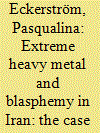

|
|
|
|
|
| Summary/Abstract |
Since the revolution in 1979, the Islamic Republic of Iran has imprisoned musicians, especially punk, hip-hop, and hard rock bands, as well as those playing heavy metal subgenres. Extreme heavy metal artists and fans emerged in the 1990s. The government soon targeted them as Satanists and began a systematic crackdown on metalheads. The metalcore band Confess is the most well-known case. The band was arrested in 2015 on counts of blasphemy, disturbing public opinion through the production of music, participating in interviews with the opposition media and propaganda against the Islamic Republic of Iran, among other charges. The majority of secular countries today do not consider extreme heavy metal to be transgressive. This is not the case in contexts where religious traditions have a significant influence on society. By analysing the narrative of the band Confess, the purpose of this paper is to provide an understanding of how Iranian extreme metal musicians resist religious oppression, challenge their government, religious precepts, and social values through their music.
|
|
|
|
|
|
|
|
|
|
|
|
|
|
|
|
| 6 |
ID:
188977


|
|
|
|
|
| Summary/Abstract |
This article examines the depiction and construction of Muslim identity in Indonesian cinematic discourse. We conducted a close reading of our case study, which is Nurman Hakim’s Islamicate film trilogy about Indonesian Muslims: 3 Doa 3 Cinta (2008), Khalifah (2011), and Bid'ah Cinta (2017). Consistently exploring the theme of moderate Muslim identity in the age of global terrorism, the films shed light on the development of Indonesian Muslim self-representation over a decade (2008–2017). The goal of discourse analysis is to assess how narrative and stylistic elements in films are used to construct a moderate Muslim identity. Our findings indicate a shift in the identity discourse between the first and subsequent films. While the first film attempts to construct a moderate Muslim identity as a reaction to illiberal Islamophobia, the second and third films move toward articulating liberal Islamophobia. We argue that this dynamic of representational politics reflects contemporary Indonesia’s shifting political discourse on moderate Islam.
|
|
|
|
|
|
|
|
|
|
|
|
|
|
|
|
| 7 |
ID:
188975


|
|
|
|
|
| Summary/Abstract |
This article explores how Javanese identity has shifted away from Javanese Islam (kejawen) to a more shari’ah-centric identity. This shift is evident within the trah, a Javanese bilateral decent group or social organisation consisting of generations of children, grandchildren and great-grandchildren, including spouses and subsequent descendants. Long-term observations were conducted in this research through participation in various trah activities and in-depth interviews with trah members. The research found that initially, the trah members were kejawen, namely Javanese who identify as Muslims, but who adhere to Javanese beliefs and ritual practices that have been acculturated into Islamic teachings. Kejawen have a high appreciation of Javanese art and culture as part of their identity. However, trah members began to identify with shari’ah-centric piety, having internalised various aspects of a shari’ah lifestyle that is deemed more Islamic. This shift in identity occurred during the Indonesian political Reformation era which brought freedom of expression. This freedom was manipulated by Islamic activists to fortify political positions and engender a shari’ah-centric identity. The trah has provided a platform for its members – generations of children, grandchildren and great-grandchildren – to adopt this shari’ah-centric piety.
|
|
|
|
|
|
|
|
|
|
|
|
|
|
|
|
| 8 |
ID:
188967


|
|
|
|
|
| Summary/Abstract |
This study focuses on the phenomenon that arose from the involvement of the Muslim community in the pela gandong ritual communication on December 2, 2018. Religious symbols were used to celebrate the first Advent held in Immanuel Church, Moluccas Islands, Indonesia. Symbols included chanting the call to prayer, lafadz Rawi barzanji, and the call to worship, singing hymns of praise, and lighting Advent candles. Using qualitative methods and subjective interpretive paradigms with data collected through interviews, observations were made from a phenomenological perspective, especially ritual, social transformation, social identity negotiation, and symbolic interactionism theory. The results showed that the involvement of the Muslim community in communication rituals has beliefs and values as central principles of kindred equivalence and social-community concerns. In addition, implementing cross-religious kinship in the subjective experience impacts proof of self-identity, human kinship, relationship creation, treatment acceptance, and joint worship labels. The last leads to a developed case of civic pluralism in the pre-conflict era that had been shattered by the conflict. It is likely that cross-religious civic pluralism is a necessary precondition for efforts to build theological pluralism. This article contributes to understanding Muslim communities’ subjective experience regarding cross-religious pela gandong ritual communication and encourages further research in this area.
|
|
|
|
|
|
|
|
|
|
|
|
|
|
|
|
| 9 |
ID:
188979


|
|
|
|
|
| Summary/Abstract |
This article discusses contemporary developments in Islam in Indonesia by specifically looking at Muslims living in rural Java. Whereas most studies examine urban Muslims and mostly define Islamization that leads to the emergence of the middle class and the so-called “conservative turn,” this article offers a brief discussion of the transformation of non-practicing Muslims or abangan. Through fieldwork in a remote village in Tulungagung, East Java, the article argues that the massive Islamization in contemporary Java has invited the abangan to construct their new identity of Nasionalis-cum-Nahdliyin. While the term “Nasionalis” refers to a modern ideological category, “Nahdliyin” represents a mode of religiosity that confirms local customs and traditions. Looking at their communal ceremonies, such as yasinan-tahlilan, this new identity has given the abangan a means to maintain their communal bond with their ancestral spirits on the one hand and community cohesion on the other. These communal activities are an amalgam of santri and abangan traditions with which the latter exercise their communal piety in the public space.
|
|
|
|
|
|
|
|
|
|
|
|
|
|
|
|
| 10 |
ID:
188961
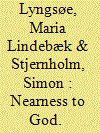

|
|
|
|
|
| Summary/Abstract |
This article advocates for an increased attention to how piously striving Muslims learn about, cultivate, and experience nearness to God. The empirical material is taken from our current research on Danish Muslims’ engagement with Islamic teaching and learning. We examine examples of oral teachings that instruct the audience to be constantly aware of God and address him directly in prayer, examples of how an awareness of God is cultivated and practiced in everyday life, and individual narratives of experiences of being close to or helped by God. With inspiration from the anthropology of Christianity as well as Islam, we propose an analytical model for understanding the process whereby Muslim efforts to draw near to God can ‘work’. Three interrelated dynamics are crucial to this process, and we identify each through our reading of existing scholarship. The dynamics at play are, respectively, a taqwa-infused faith frame, its related semiotic ideology, and a relationship of experienced reciprocal agency with God.
|
|
|
|
|
|
|
|
|
|
|
|
|
|
|
|
| 11 |
ID:
188968


|
|
|
|
|
| Summary/Abstract |
This article relates the autoethnographic lived experiences of the participant of a religious sojourn and the ensuing implications for imbibing the sacred. Drawing on the site of the Tablighi Jamaat’s 40-day khuruj in Pakistan, the author focuses on the beginning, middle, and end periods of the travel to expand on Eliade’s notion of sacred time as one that is fraught with continuous conflicts with the profane. The article concludes that experiencing spirituality in modernity requires considerable physical and mental effort apart from physically transcending the boundaries of space and time.
|
|
|
|
|
|
|
|
|
|
|
|
|
|
|
|
| 12 |
ID:
188974
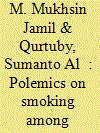

|
|
|
|
|
| Summary/Abstract |
This paper examines various views, ideas, opinions, understandings, and interpretations among Indonesian societies, including Islamic scholars and Muslim social organizations toward tobacco products and smoking practices. It also traces the history and contemporary developments of smoking practice in Indonesia. Historically, as the article shows, smoking for Indonesian societies is not simply inhaling tobacco but also a medium of social interaction and ritual practices. Moreover, this study investigates whether religious pronouncements and fatwas (Islamic edicts) on smoking, issued by some noted Islamic institutions in the country, influence smoking practices and behaviors among Indonesian Muslims. Given the vitality of religion and smoking among Indonesians, it becomes interesting to study the relationship between the two.
|
|
|
|
|
|
|
|
|
|
|
|
|
|
|
|
| 13 |
ID:
188969
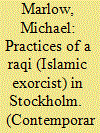

|
|
|
|
|
| Summary/Abstract |
This article investigates in depth the practices of a Stockholm-based raqi. In the first section, the principles and methods of his version of ruqya (Islamic exorcism) are described: which Qur’anic passages he perceives as being most suitable to read in the cases of different afflictions, how he complement his reading with the use of his right palm to detect the possession, and his use of the “satanic meridians,” i.e., pressure points to use to facilitate the eviction of stubborn djinns. Later, the cases of five patients are discussed in order to shed light upon those who seek out his services. One particularly interesting example concerns a patient who regularly takes ruqya against sorcery. Despite the fact that she does not believe in sorcery herself, she considers ruqya more beneficial for her well-being than Western treatments. Next, the raqi’s perspective on psychotherapy and on mental illness in general are then presented. Finally, the problems of non-contextualized interviews versus ethnographic observations carried out as part of fieldwork for the purposes of gathering information are illustrated.
|
|
|
|
|
|
|
|
|
|
|
|
|
|
|
|
| 14 |
ID:
188962


|
|
|
|
|
| Summary/Abstract |
While Ramadan in Western societies has been studied extensively in relation to health issues, no research to date has explored its representation through social scientific lenses. This article uses the Greater Western Sydney region in New South Wales, Australia, as a case study. This agglomeration of suburbs from the outer western suburbs of Sydney to the Blue Mountains has the highest proportion of Muslims in the country. To understand the representation of Islam in this region, this paper first analyses the articles in its major and local newspapers to then contrast them to the way the Ramadan festival is represented by mosques on their websites. This research discovers that Ramadan in Sydney newspapers tends to be reported in a secular fashion with a stronger focus on its public and economic activities. The focus of a large proportion of these articles on the way it attracts business demonstrates that it is a well-accepted event in Australia. In contrast, the pictures provided in Muslim sites in Sydney are more religious than the newspaper depiction and show a contrast with regard to ethnicity and gender. While the newspaper pictures are from the public sphere and tend to be multicultural across various Muslim ethnicities and do not show gender segregation, the online pictures from Muslim organisation show a strong gender segregation and represent the local ethic community they serve. While the representations in the public sphere are neo-liberal post-secularism and multiculturalism, those from these organisations are curating religiously important rather than business orientated moments in their community.
|
|
|
|
|
|
|
|
|
|
|
|
|
|
|
|
| 15 |
ID:
188972
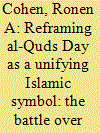

|
|
|
|
|
| Summary/Abstract |
Since 1980, on the last Friday of Ramadhan, millions of Muslims all over the world have held parades to celebrate Jerusalem Day—al-Quds Day—to symbolically strengthen the Palestinian people in their struggle against Israel. It was established by Ayatollah Khomeini, who saw himself as the potential leader of the Muslim world, and Iran proclaimed it to be a national day on a par with other national and religious days and events such as Nowruz, A’shuraa, Ramadhan. This article explores the legitimacy of the status of al-Quds Day for Arab and Muslim countries and its change over time from being enthusiastically celebrated within the Arab world to becoming a marginal event that many Arab and Muslim states have been trying to ignore. The article’s main argument is that although al-Quds Day is still considered to have symbolic value for Islam and unification, the use made of it to further Iranian political interests seems to have diminished its legitimacy and reputation among non-Shiite communities in the Middle East.
|
|
|
|
|
|
|
|
|
|
|
|
|
|
|
|
| 16 |
ID:
188973


|
|
|
|
|
| Summary/Abstract |
This study aimed to explore Bangladeshi religious leaders’ perspectives on the Rohingya refugee crisis and its implications for Bangladesh. We have employed a triangulation of methods composed of content analysis, qualitative intensive interviews and a robust Internet search to conduct the study. Bangladesh has experienced many impacts from the massive influx of the Rohingya into its territory. The Bangladeshi religious leaders reject the Burmese Government’s official narrative that the Rohingya are illegal Bengali immigrants. They condemn the Rohingya’s human rights abuse and opine that Burma must accept the refugees and reinstate their citizenship. The article, in the end, offers some pragmatic policy recommendations to surmount the Rohingya crisis.
|
|
|
|
|
|
|
|
|
|
|
|
|
|
|
|
| 17 |
ID:
188963
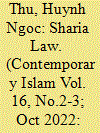

|
|
|
|
|
| Summary/Abstract |
Muslims in the Mekong River Delta are mainly ethnic Cham (one of 54 ethnicities in Viet Nam), living in An Giang Province. They adopted Islam in the early days. This religion has formed Cham characteristics in the community culture different from the Kinh (Vietnamese), Hoa (Chinese), and Khmer ethnic groups in the surrounding areas. This difference is due to the influence of religious views, especially the Islamic Sharia law. In reality, Sharia law is appropriately interpreted from the perspective of Cham Muslims, so it is simpler than the “orthodox” original law. Cham Muslims apply this simple interpretation in their religious life, especially in economic behavior and sharing benefits through their zakat practice. Based on ethnographic fieldwork in An Giang Province, this article analyzes the current understanding of Sharia law in the Cham Muslims community, the application of this understanding in economic behavior, and the fulfillment of zakat duties.
|
|
|
|
|
|
|
|
|
|
|
|
|
|
|
|
| 18 |
ID:
188964
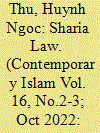

|
|
|
|
|
| Summary/Abstract |
Muslims in the Mekong River Delta are mainly ethnic Cham (one of 54 ethnicities in Viet Nam), living in An Giang Province. They adopted Islam in the early days. This religion has formed Cham characteristics in the community culture different from the Kinh (Vietnamese), Hoa (Chinese), and Khmer ethnic groups in the surrounding areas. This difference is due to the influence of religious views, especially the Islamic Sharia law. In reality, Sharia law is appropriately interpreted from the perspective of Cham Muslims, so it is simpler than the “orthodox” original law. Cham Muslims apply this simple interpretation in their religious life, especially in economic behavior and sharing benefits through their zakat practice. Based on ethnographic fieldwork in An Giang Province, this article analyzes the current understanding of Sharia law in the Cham Muslims community, the application of this understanding in economic behavior, and the fulfillment of zakat duties.
|
|
|
|
|
|
|
|
|
|
|
|
|
|
|
|
| 19 |
ID:
188965
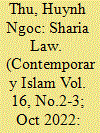

|
|
|
|
|
| Summary/Abstract |
Muslims in the Mekong River Delta are mainly ethnic Cham (one of 54 ethnicities in Viet Nam), living in An Giang Province. They adopted Islam in the early days. This religion has formed Cham characteristics in the community culture different from the Kinh (Vietnamese), Hoa (Chinese), and Khmer ethnic groups in the surrounding areas. This difference is due to the influence of religious views, especially the Islamic Sharia law. In reality, Sharia law is appropriately interpreted from the perspective of Cham Muslims, so it is simpler than the “orthodox” original law. Cham Muslims apply this simple interpretation in their religious life, especially in economic behavior and sharing benefits through their zakat practice. Based on ethnographic fieldwork in An Giang Province, this article analyzes the current understanding of Sharia law in the Cham Muslims community, the application of this understanding in economic behavior, and the fulfillment of zakat duties.
|
|
|
|
|
|
|
|
|
|
|
|
|
|
|
|
| 20 |
ID:
188966
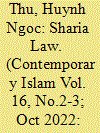

|
|
|
|
|
| Summary/Abstract |
Muslims in the Mekong River Delta are mainly ethnic Cham (one of 54 ethnicities in Viet Nam), living in An Giang Province. They adopted Islam in the early days. This religion has formed Cham characteristics in the community culture different from the Kinh (Vietnamese), Hoa (Chinese), and Khmer ethnic groups in the surrounding areas. This difference is due to the influence of religious views, especially the Islamic Sharia law. In reality, Sharia law is appropriately interpreted from the perspective of Cham Muslims, so it is simpler than the “orthodox” original law. Cham Muslims apply this simple interpretation in their religious life, especially in economic behavior and sharing benefits through their zakat practice. Based on ethnographic fieldwork in An Giang Province, this article analyzes the current understanding of Sharia law in the Cham Muslims community, the application of this understanding in economic behavior, and the fulfillment of zakat duties.
|
|
|
|
|
|
|
|
|
|
|
|
|
|
|
|
|
|
|
|
|